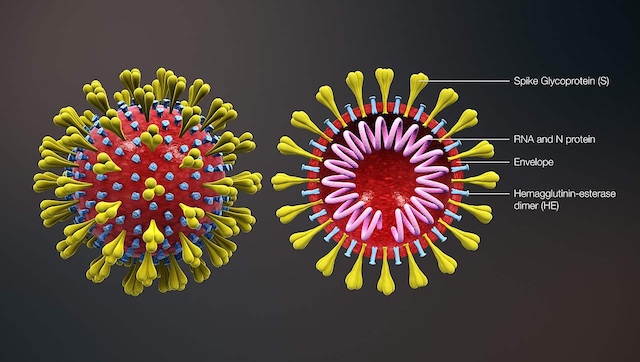So far, more than 35 million cases of COVID-19 have been reported in the world. While most of the infected people present with flu-like symptoms such as cough, sore throat, sneezing, body pain and loss of taste and smell, there have been plenty of cases where people do not present with any symptoms despite having a high viral load in their body. According to scientists from the Department of Pharmacology at the University of Arizona, US, the reason behind this is that SARS-CoV-2 suppresses pain in people who get COVID-19 and yet experience a few or no symptoms. The role of neuropilin-1 It was already known that viruses can infect the human host cells via protein receptors which are present on the membrane of the cell. Once the current pandemic had begun, scientists had concluded that the spike proteins present on the outer covering of SARS-CoV-2 use the angiotensin-converting enzyme 2 receptor (ACE2 receptor) to enter the body. However, later it was found that neuropilin-1 (NRP1) also acts as a receptor for the SARS-CoV-2 virus. NRP1 is a transmembrane protein, which plays an important role in the development of the nervous and cardiovascular system. It has also been reported that NRP1 interacts with some proteins such as vascular endothelial growth factor (VEGF) and semaphorin 3A (Sema3A) and results in the formation of tumours and other diseases such as cancer and rheumatoid arthritis. COVID-19 causing virus blocks the pain receptors Neuropilins (both NRP1 and NRP2) are also associated with one of the pain pathways of the body. It was found that VEGF-A binds to the neuropilin receptor in a lock and key manner, which is followed by a cascade of events that lead to hyperexcitability of nerve cells (neurons) and ultimately result in pain. According to the study published in Pain, the journal of the International Association for the Study of Pain, on 1 October 2020, the spike proteins of SARS-CoV-2 also bind to the neuropilin receptors exactly at the same spot as VEGF-A, thus interfering with the pain pathway. To confirm their finding, scientists conducted a series of experiments on rodent models in the labs, where they used VEGF-A as a trigger to provoke the excitability of the nerve cells, thus creating pain. Following that the scientists injected the rodents with SARS-CoV-2 spike protein. The results of the study The results of the study showed that the spike protein of SARS-CoV-2 completely blocked the VEGF-induced pain signalling. The pain was completely reversed at both extremely high doses or extremely low doses of the spike protein. The scientists concluded that by designing small molecules against neuropilin receptors, they would be able to form a pain-relieving medication better than opioids. The scientists further added that due to the restriction of pain by blocking the VEGF pain pathway, there has been a rise in the number of asymptomatic cases of COVID-19. However, the ability of such patients to spread the disease remains similar to that of patients who showed symptoms. For more information, read our article on Don’t miss the signs of these diseases in the panic around COVID-19. Health articles in Firstpost are written by myUpchar.com, India’s first and biggest resource for verified medical information. At myUpchar, researchers and journalists work with doctors to bring you information on all things health.
The results of the study showed that the spike protein of SARS-CoV-2 completely blocked the VEGF-induced pain signalling.
Advertisement
End of Article


)

)
)
)
)
)
)
)
)



